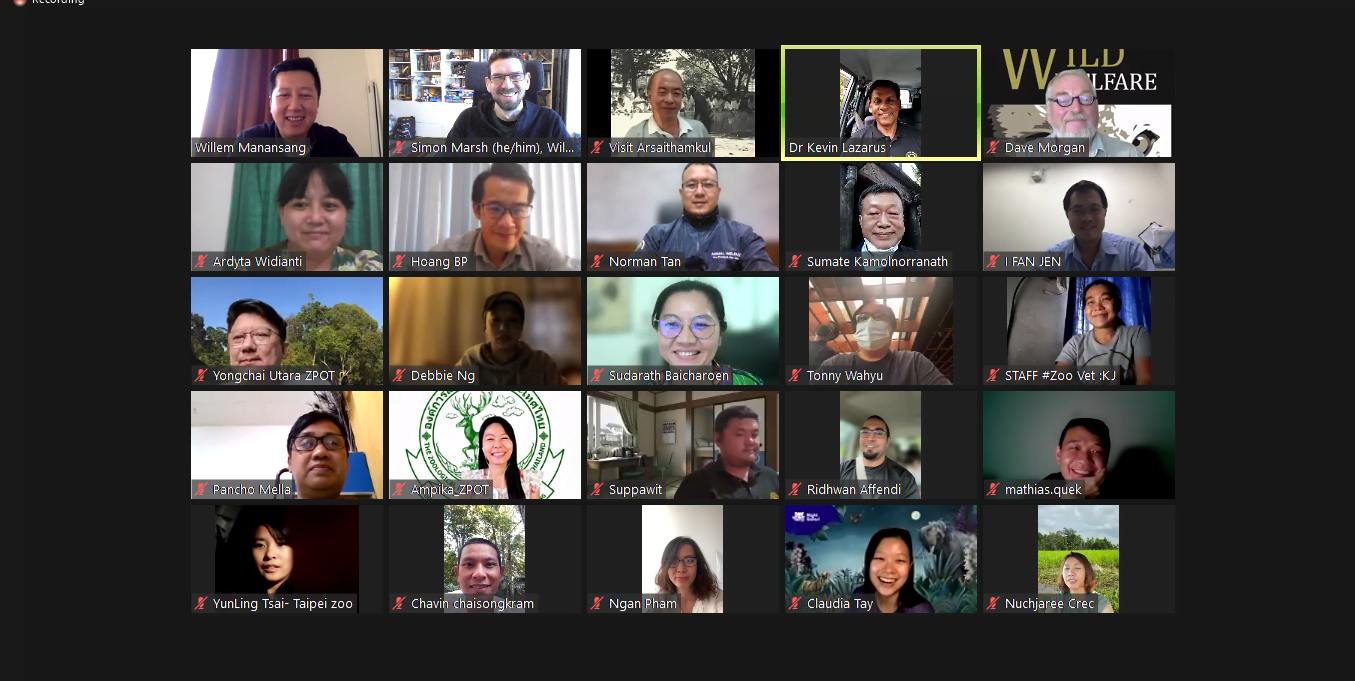Seven Countries – One Animal Welfare Goal
The Wild Welfare team has been delivering training across seven different countries simultaneously in the past few weeks. An online workshop hosted by the Southeast Asian Zoos and Aquariums Association (SEAZA) gave us the opportunity to conduct our first entirely virtual auditor training programme which we would usually deliver in-country.
The online training sessions were presented to 53 participants from Malaysia, Taiwan, Indonesia, Singapore, Vietnam, Thailand and the Philippines. Simon Marsh and Dave Morgan, Wild Welfare’s Director and Field Director respectively, discussed animal welfare auditing principles and explained the attributes that make a good auditor.
How does auditor training impact animals?
Auditor training can have a positive impact on animal welfare through training staff to detect opportunities for improvements within the care and management of their animals. These could be environmental changes which encourage more natural behaviours, for example climbing, swimming or resting. Auditor training can also equip staff with the tools to highlight actions which might need to be taken to improve nutrition, health care, behaviours or indeed any other aspect of animal care which will impact welfare.
Over the course of two days, the trainee auditors undertook one day of theory training followed by Q&A sessions with Wild Welfare staff and experienced SEAZA auditors. The second day was reporting back on how they carried out a trial audit of the facility. The trial audit was undertaken by a team from each country at a facility that was accessible to them during a two week period between the first and second day of training. On the second day the trainee auditors presented their findings and discussed the process, how they felt it went and were quizzed on how they could have conducted it differently, challenged what they found and how they assessed their findings.
“Training more auditors to be able to undertake captive facility audits across the region is a key part of our strategy to certify and promote good welfare standards in zoos, aquariums and sanctuaries, creating immediate and sustainable improvements to captive animal welfare.” Simon Marsh.
Wild Welfare has been in partnership with Southeast Association of Zoos and Aquariums (SEAZA) for several years, assisting them in developing animal welfare standards and policy to improve animal welfare practices across its membership. SEAZA encompasses nine countries and two national associations with a total of 44 members.
How can this training impact animal care staff?
Part of our strategy in Asia is to build capacity and train staff to understand what good welfare looks like and how to achieve good standards of welfare for animals. By building capacity we can empower the staff and facilities to develop animal welfare assessments and standards to meet optimum care for wild animals in captivity.
Before the pandemic Wild Welfare was working closely with SEAZA and its members to develop the processes and skills needed to become an auditor and assess if a zoo or aquarium is meeting the required standard set by SEAZA to gain animal welfare accreditation. The SEAZA accreditation system is not a pass or fail process but a way of identifying areas of concern and giving guidance and a time frame to achieve higher standards of animal care and welfare. This training is usually carried out in person with Wild Welfare staff accompanying trainee auditors on an actual inspection of a facility.
With travel restrictions still in place we have been working with SEAZA through 2020 and 2021 to develop a system of online auditor training. The pandemic has not only made it impossible for Wild Welfare to travel to Southeast Asia, it has made it very challenging to the staff working in those countries to even travel within their own countries to carry out animal welfare audits, let alone train new auditors. However, building up the knowledge and experience to be an effective animal welfare auditor is vital to raising animal welfare standards and maintaining those standards across the region.
By assisting SEAZA members to meet the required animal welfare standard, Wild Welfare is improving the lives of thousands of captive wild animals across Asia and making sure these improvements are long-term and sustainable.
~ENDS~
Notes to Editors
For more information or interview requests please contact Wild Welfare on communications@wildwelfare.org
Wild Welfare: Wild Welfare is a global organisation committed to improving animal welfare for captive wild animals. By working together with animal welfare organisations and captive wildlife facilities, including zoos, aquariums and sanctuaries, we achieve long-term and sustainable solutions to the most critical issues facing wild animals in captivity.
Our vision is a world where every captive wild animal is able to thrive and live a good life. Find out more at: wildwelfare.org. Registered charity in England and Wales No.1165941.
SEAZA: SEAZA is the Regional Zoo and Aquarium Association of Southeast Asia whose aim is to continuously improve animal welfare, biodiversity conservation, and public awareness through their work within and beyond our institutions. Find out more at: www.seaza.asia





